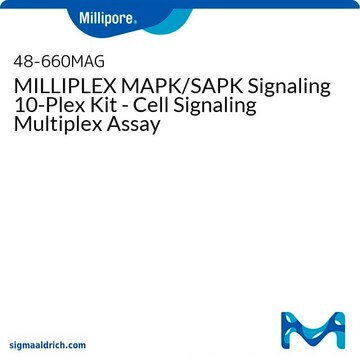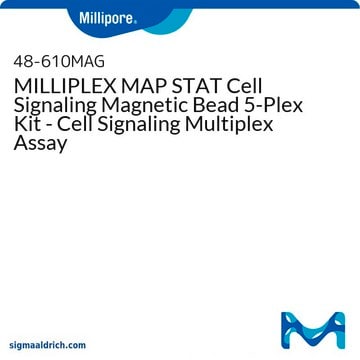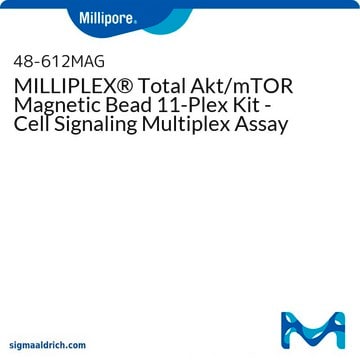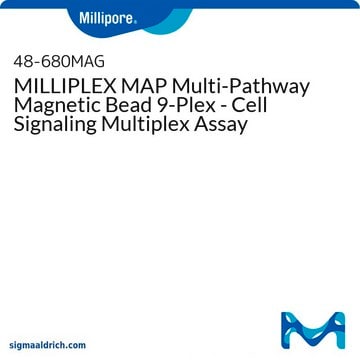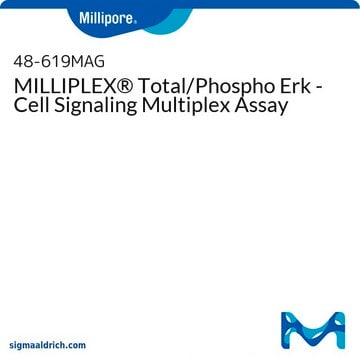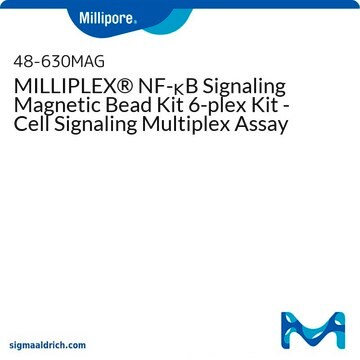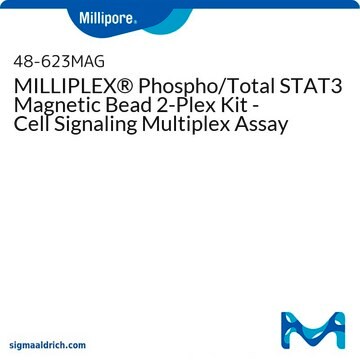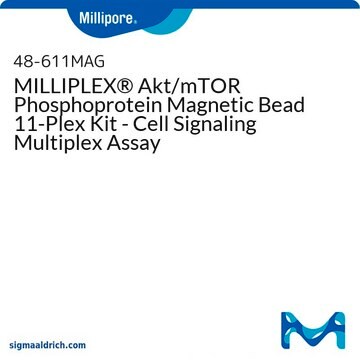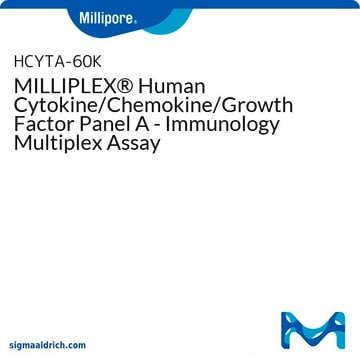HPRTKMAG-01K
MILLIPLEX® RTK Phosphoprotein Magnetic Bead Panel- Cell Signaling Multiplex Assay
allows simultaneous relative quantitation of multiple proteins in tissue and cell lysate samples
About This Item
Productos recomendados
Quality Level
species reactivity
human
manufacturer/tradename
Milliplex®
technique(s)
multiplexing: suitable
detection method
fluorometric (Luminex xMAP)
shipped in
ambient
General description
The MILLIPLEX® RTK Phosphoprotein Bead Customizable Panel is used to detect changes in phosphorylated (panTyr) c-Kit, c-Met/HGFR, EGFR, ErbB2/HER2, ErbB3/HER3 , ErbB4/HER4 , FGFR1 , FLT3 , IGF-1R, M-CSFR, PDGFRα, PDGFRβ, TIE1, TIE2, VEGFR1, VEGFR2, and VEGFR3 in cell lysates using the Luminex® system.
The MILLIPLEX® portfolio offers the broadest selection of analytes across a wide range of pathways. Once the panel of interest has been identified, you can rely on the quality we build into each kit to produce results you can trust. Performance criteria evaluated during the validation process include: cross-reactivity, assay CVs, kit stability, and sample behavior. In addition, each kit meets stringent Quality Control criteria to ensure lot-to-lot reproducibility.
The MILLIPLEX® RTK Phosphoprotein Bead Panel includes:
- Positive and negative control cell lysates provided to qualify assay performance
- Configurable beads to capture analytes of interest
- Optimized detection antibody cocktail designed to yield consistent analyte profiles within a panel
Panel Type: Cell Signaling
Specificity
Application
- Analytes: c-Kit, c-Met/HGFR (panTyr), EGFR (pan Tyr), ErbB2/HER2, ErbB3/HER3 (panTyr) ,ErbB4/HER4 (panTyr), FLT3 (pan Tyr), IGF-1R (pan Tyr), M-CSFR (pan Tyr), PDGFR-α (pan Tyr), PDGFRß (pan Tyr), TIE1 (pan Tyr,) Tie2 (pan Tyr), VEGFR1 (pan Tyr), VEGFR2 (pan Tyr), VEGFR3 (pan Tyr), FGFR1
- This 17-plex panel, unlike most signaling kits that are fixed/premixed, is customizable so that it is possible to choose only those analytes that are wanted or needed.
- Recommended Sample type: cell lysate
- Recommended starting concentration: 40 to 1,000 μg protein/mL
- Assay Run Time: Overnight
- Research Category: Signaling Apoptosis & Cancer
Features and Benefits
Packaging
Storage and Stability
Legal Information
Disclaimer
signalword
Danger
hcodes
Hazard Classifications
Acute Tox. 4 Oral - Aquatic Acute 1 - Aquatic Chronic 2 - Eye Dam. 1 - Skin Irrit. 2
Storage Class
10 - Combustible liquids
Certificados de análisis (COA)
Busque Certificados de análisis (COA) introduciendo el número de lote del producto. Los números de lote se encuentran en la etiqueta del producto después de las palabras «Lot» o «Batch»
¿Ya tiene este producto?
Encuentre la documentación para los productos que ha comprado recientemente en la Biblioteca de documentos.
Contenido relacionado
Multiplex assays simplify cancer research by measuring multiple biomarkers simultaneously for various signaling pathways.
Multiplex assays simplify cancer research by measuring multiple biomarkers simultaneously for various signaling pathways.
Multiplex assays simplify cancer research by measuring multiple biomarkers simultaneously for various signaling pathways.
Multiplex assays simplify cancer research by measuring multiple biomarkers simultaneously for various signaling pathways.
Nuestro equipo de científicos tiene experiencia en todas las áreas de investigación: Ciencias de la vida, Ciencia de los materiales, Síntesis química, Cromatografía, Analítica y muchas otras.
Póngase en contacto con el Servicio técnico